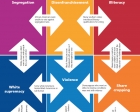Cause and consequence
While E.H. Carr’s claim that ‘all history is the history of causes’ may have been widely challenged by historians anxious to demonstrate the breadth of their concerns and the range of other important questions to be asked about the past, causal explanation features prominently in history teaching and learning at all stages within the school curriculum. The resources in this section will help teachers to think about the nature of progression in students’ understanding of cause and consequence and to recognise common misconceptions that they may need to address. The materials offer a wide range of practical strategies, as well as insights drawn from historians’ practice and research into students’ understanding, that will help teachers to determine the most useful ways of helping students to develop more powerful causal explanations. Some of them also highlight the need to pay more attention in planning schemes of work to the identification, explanation and evaluation of historical consequences. Read more
-

Using nominalisation to develop written causal arguments
ArticleClick to view -

Waking up to complexity
ArticleClick to view -

What’s The Wisdom On... Consequence
ArticleClick to view -

What’s in a narrative? Unpicking Year 9 narratives of change in Stalin’s Russia
ArticleClick to view -

What’s the wisdom on… Causation
ArticleClick to view -

Witchcraft - Using fiction with Year 8s
ArticleClick to view -

‘If you had told me before that these students were Russians, I would not have believed it’
ArticleClick to view -

‘Its ultimate pattern was greater than its parts’
ArticleClick to view

